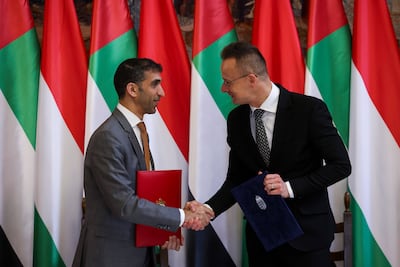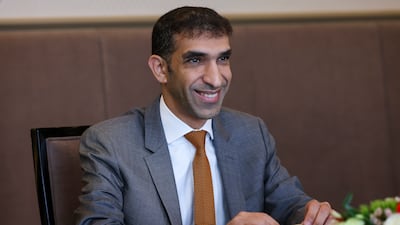The UAE and Hungary have signed a deal to develop a mixed-use property project in Budapest with an initial capital investment of €5.8 billion ($6.3 billion), which may increase to €10 billion in later phases, according to the UAE Minister of State for Foreign Trade.
The UAE has selected Abu Dhabi-based property developer Eagle Hills to work on the project once the deal has been ratified, Dr Thani Al Zeyoudi told The National on Thursday.
“This is a government-to-government agreement which laid out the foundation for companies like Eagle Hills to come in and do huge investments in the property development sector in Hungary,” he said.
“The initial capital of the project is €5.8 billion but we're expecting that number to reach even to €10 billion [$10.9 billion] if things go as per the full plan.”
The two countries signed an economic co-operation agreement in Budapest aimed at stimulating trade and investment flows between them in priority sectors including real estate, infrastructure, industry, commerce, investment, tourism and logistics, a UAE government statement on Thursday said.
UAE-Hungary's non-oil trade in 2023 increased 23.1 per cent to more than $1.127 billion, a threefold rise from $409 million in 2019, and the agreement seeks to build on this growth, it added.
Eagle Hills, which is chaired by Mohamed Alabbar who is also the founder of Emaar Properties, also has projects in countries including Albania, Serbia, Egypt, Morocco, Bahrain, Oman, Jordan, Ethiopia and the UAE.
The Budapest project is “comprehensive”, featuring residential and commercial towers, with the Hungarian government planning to connect the district with the railway network and direct access to the airport, Dr Al Zeyoudi said.
“It is a complex project. It is going to go through different phases and we're going to focus on the €5.8 billion initially to make sure that we move quickly and implement the right quality of the project. Any expansion that's going to come will be an added plus to the whole project,” he said.
The project should take a “couple of years” to complete but the emphasis now is on finalising the business terms between Eagle Hills and the Hungarian government.

Globally, the UAE is exploring investment and acquisition opportunities in key sectors such as clean energy, logistics and food security, the minister said.
“We will see many of the renewable energy announcements soon with many countries around the world,” he said.
“Since I just came back from Hungary, it's one of the topics which we were discussing and interested in doing with them, but it's still under technical dialogue.”
The Emirates, the Arab world’s second-largest economy, plans to achieve carbon neutrality by 2050.
It hosted the Cop28 climate conference in November, which introduced many companies and funds to the opportunities in the UAE’s fast-growing clean energy industry.
UAE to exceed target of 26 Cepas
The UAE is focused on boosting its non-oil trade with countries around the world as it seeks to diversify its economy and attract foreign investment.
The country will exceed its initial target of signing 26 Comprehensive Economic Partnership Agreements (Cepas) because of its pace of work and interest from other countries, the minister said.
“I believe we're going to go beyond the 26 trade deals because of the speed in which we're working, the different approach and reach-out we're having from other countries,” he said.
“So for us it's a critical project, which we're going to continue moving forward.”
The UAE aims to conclude another seven to eight new Cepa deals in 2024, Dr Al Zeyoudi said.
The country is preparing the “final touches” for the official signing of Cepas that were concluded in the last quarter of 2023 and early this year including with the Republic of the Congo, South Korea, Colombia, Costa Rica, Mauritius and Kenya, the minister said.
The UAE is also close to concluding agreements in the next two to three weeks with Malaysia, Vietnam, Chile and a fourth nation that he declined to name at this stage.
The UAE will “soon” start talks with New Zealand and Australia, the minister added.
“We are doing the official technical preparation. We are starting and we expecting to conclude both countries before the end of the year,” he said.
Red Sea crisis impact
The Red Sea shipping attacks that have disrupted global trade are a concern as they will affect the global supply chain and the price of consumer goods, the minister said.
However, the UAE has “not seen much impact” on its global trade, he said, citing the country's non-oil foreign trade hitting a record Dh3.5 trillion ($953 billion) in 2023.
“We outperformed in the last quarter of last year and even February trade was in general excellent. We don't have the numbers yet but things are even going forward,” he said.
The Red Sea crisis, and the Covid-19 pandemic before that, have highlighted the importance of exploring alternative trade routes and markets for different commodities.
He cited examples such as plans for the India-Middle East-Europe Economic Corridor announced during the G20 meeting and working with neighbouring countries in the region such as Iraq, Iran and India for easier movement of container vessels.
The UAE is also working on a railway project linking Abu Dhabi and Sohar.
“Alternatives are critical, diversity is important and we have to ensure that's available so we don't have a huge impact when an emergency happens in the future,” he said.
The UAE's trade position will be further bolstered by its removal from the Financial Action Task Force’s grey list.
“Things were growing in the last two years even during us being on the grey list and I'm sure now with the removal from [the] FATF [list], things are going to flourish even faster than before,” Dr Al Zeyoudi said.
Work ahead after WTO conference
Work is also progressing on the World Trade Organisation’s agenda following the 13th Ministerial Conference in Abu Dhabi on February 26, said Dr Al Zeyoudi, who was also the chair of the biennial gathering of global trade ministers.
Discussion on key topics, including the reform of the WTO's dispute settlement system, will continue in Geneva, where the WTO is based, after the MC13 meetings set the foundation for further negotiations, he added.


